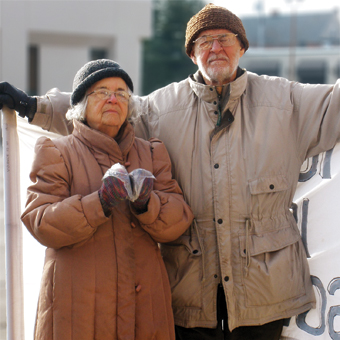At age 85, Jean Gump was released from prison after being arrested and jailed with 12 other protesters. They were caught trespassing at an off-limits federal area at the Y-12 National Security Complex in Oak Ridge, Tennessee, home of the atom bomb.
“Periodically, I put myself on the line for what I believe in,” she says, reflecting on her history of civil disobedience. “Killing people with weapons of mass destruction is inappropriate, so I feel I need to be on the front line of resistance.”
Gump has been imprisoned about 20 times for taking a stand for social justice causes and has been arrested on so many occasions she’s lost count. However the petite mother of 12 children didn’t start out that way. In 1950 she and her husband, Joe, were married and settled in the pleasant, working class town of Morton Grove, Illinois, northwest of Chicago, population 25,000. Back then they led rather traditional Catholic lives: daily Mass, fasting, meatless Fridays, and confession on Saturdays.
Activist lifestyle: “I was brought up as an absolute bigot,” says Gump, who later decided racial prejudice was unacceptable for herself or for her family. “I always told my children that they should defend anyone on the playground who was being bullied,” she says.
One day while her kids were watching TV, they saw a news story about the poor treatment African Americans were receiving in the South. Her son John turned to his mother and asked what she was going to do about it.
“I was puzzled at first,” she says. “Then he reminded me of my own advice about helping those hurt by bullies. I took the next available plane to Alabama and marched with Martin Luther King Jr. from Selma to Montgomery.”
In the 1970s Gump began attending anti-nuclear weapon meetings while Joe, their teenage daughters, and her sister-in-law took turns babysitting the younger children. But she was always home in time to cook dinner. In the 1980s, with the children all grown and the arms race heating up, Gump joined Plowshares, a peace group founded by Catholic activists Daniel and Philip Berrigan.
Plowshares seeks to rid the world of nuclear weapons through acts of civil disobedience. One such action has been to pound the lid of missile silos with a hammer as a witness to Isaiah 2:1-6, “They will beat their swords into plowshares . . . nation shall not lift sword against nation nor shall they teach war anymore.”
The war at home: On Palm Sunday 1986 a priest picked up Gump at her home and they headed for Holden, Missouri. She didn’t tell anyone where she was going, and Joe didn’t hear from her until the evening news reported that “five activists had symbolically ‘disarmed’ two Minuteman II missiles on Good Friday.”
Authorities charged Gump and four young Catholic men with conspiracy and destruction of government property. The judge sentenced her to four years at the Correctional Institution for Women in Alderson, West Virginia. During that time she spent 63 days in solitary confinement.
This time the reaction of the Gump children ranged from the objection of daughter Mary Pat, a senior counsel for Bank of America, to the support of Kathy, a hippie who loved it all. Nevertheless, all the children visited their mom in prison.
But Joe, at the time a chemical engineer for a company that made automatic control equipment for nuclear power plants and intercontinental ballistic missiles, was not happy with his wife’s actions. “Joe was so against what I’d done,” says Gump. “He knew something was going on, but I didn’t discuss it with him because I didn’t want him to be brought in on conspiracy charges.”
Life at their church was more difficult. Some parishioners shunned Gump, while others called her unpatriotic and even a traitor. Her pastor remained a silent supporter.
Gump’s trial and sentencing both disgusted and consumed Joe, who ended up quitting his job in June 1987. Two months later he and a priest went to the K-9 missile silo in Butler, Missouri (near Kansas City) to perform the Plowshares ritual himself—landing him in federal prison for 42 months.
Peace be with you: The Gumps’ devotion to peace and justice has consistently been inspired by the Beatitudes and rooted in their Catholic faith.
“We’re pacifists,” Jean Gump says with no apologies, regrets, or doubts. “Our judgment may not always be right, but we leave it up to God to take care of the consequences. We have to be sure about what we do and say. This is our moral obligation.”
She realizes that not everyone will agree with her views on the business of war-making, nor are most willing to go to prison over the issue. Gump also recognizes that one person can’t always create change, but that doesn’t deter her from pressing on.
“Accomplishment is very seldom a consideration when we take these actions,” she says. “If something good happens, we’re glad. But our main objective is for the public to know about the dangers of nuclear weapons. We are people of conscience who know that nuclear weapons are immoral, so we make our statements and expect to be found guilty at our trials.”
This article appeared in the September 2012 issue of U.S. Catholic (Vol. 77, No. 9, pages 47-48).














Add comment